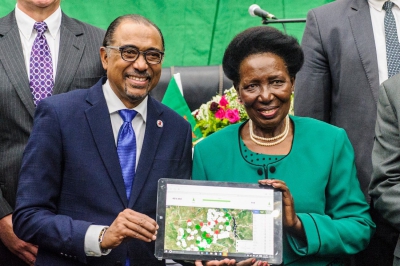The Zambia Integrated Health Situation Room centralizes health data for HIV, Tuberculosis (TB), maternal health and Malaria to ensure more effective and precise programming to reach more people with services.
Lusaka/ZAMBIA, 6 March 2018—Inonge Mutukwa Wina, the Vice-President of Zambia, and Michel Sidibé, Executive Director of the Joint United Nations Programme on HIV/AIDS (UNAIDS), today launched an innovative new tool to track progress and identify gaps in HIV, TB, maternal health and Malaria programming in Zambia.
The Zambia Integrated Health Situation Room shows in real-time service delivery data and produces a comprehensive picture and understanding of key health areas in Zambia. It enables quick feedback on results at county and community levels and identifies bottlenecks to service delivery. It aims to expedite and streamline communication between policymakers and implementers to Fast-Track the national AIDS response towards Ending AIDS as a public health threat by 2030.
“The e-government system is being implemented to improve the quality of lives of the people of Zambia. This will be done by increasing access to information, ensuring accountability and timely decision-making by policy makers,” said Ms Wina during the launch.
Data from the Integrated Health Situation Room shows that, in 2017, Zambia had approximately 830 000 people on HIV treatment. In the same year, more than 820 000 pregnant women were tested for HIV. Of the 76 000 mothers needing HIV treatment in 2017, 89% (68 000) received it. Part of the success of the high coverage of the prevention of mother-to-child transmission of HIV programme in Zambia is that more babies are being delivered in facilities—currently 70% of births. This ensures that pregnant women living with HIV are diagnosed early and receive HIV treatment.
The Integrated Health Situation Room therefore enables programme staff to intensify local efforts to ensure that adults and children living with HIV have regular access to care and that HIV treatment stocks are replenished quickly should stock-outs occur.
“We can move from vulnerability to resilience only if communities have more information, access to resources and overall a more equitable social fabric,” said Mr Sidibé.
The Zambia Integrated Health Situation Room, developed by the Zambia Ministry of Health, in collaboration with UNAIDS, is supported by the Government of Sweden (SIDA), the Center for Disease Control (CDC) and other partners, which contributed resources as part of their continued support to improving monitoring and evaluation of the global AIDS epidemic.
Resources
Highlights
PRESS RELEASE: Zambia launches Integrated Health Situation Room to Fast-Track progress towards Ending AIDS, TB and Malaria
6 March 2018
Copyright ©
2026
UNAIDS

